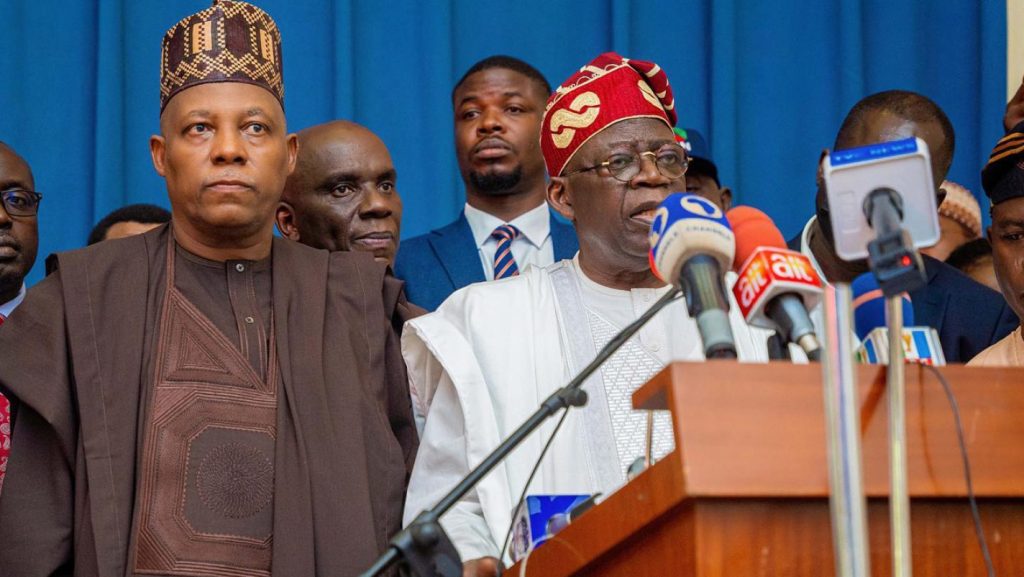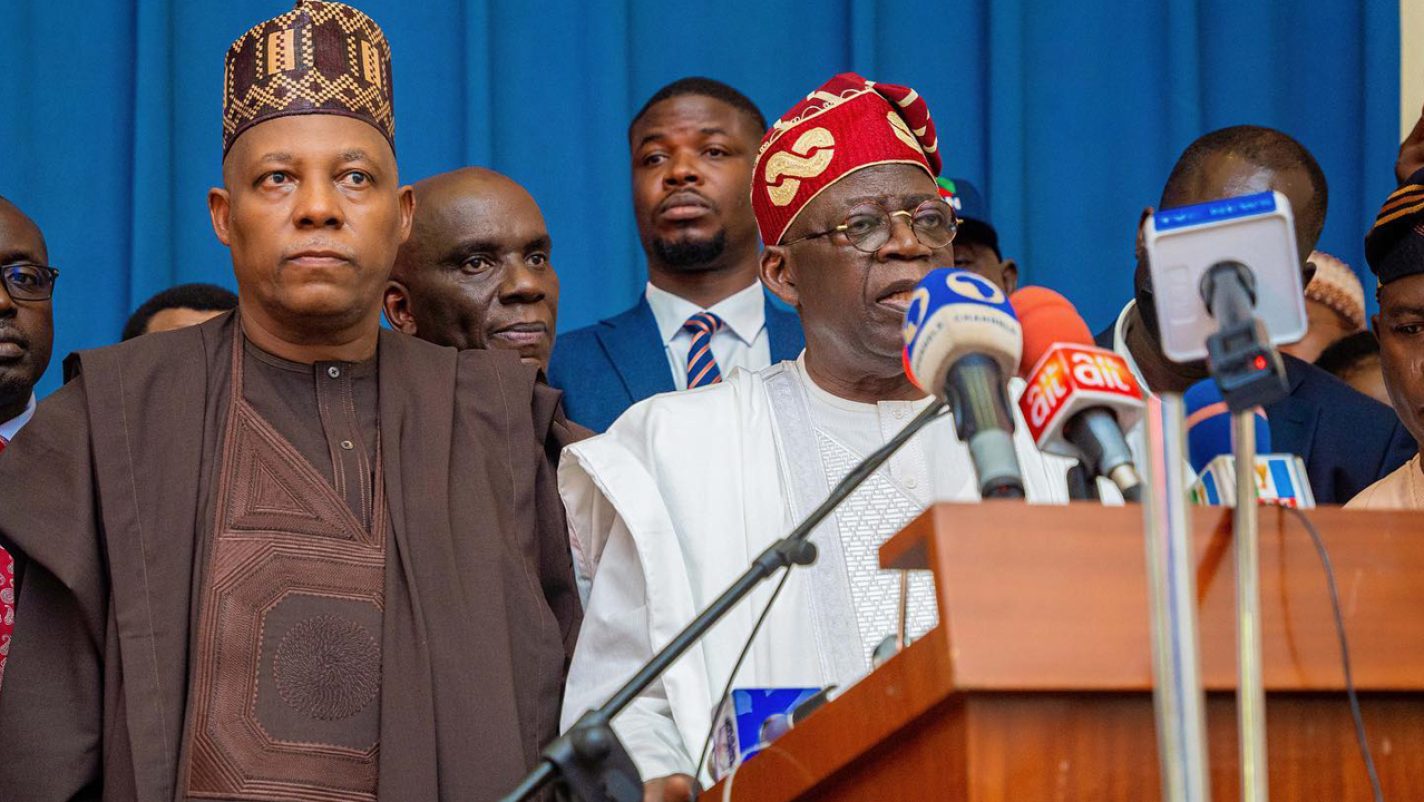When Bola Ahmed Tinubu chose to run on a Muslim-Muslim ticket, he set Nigeria on the shortest distance to becoming an Islamic Caliphate. But unfortunately, a Tinubu win would put Nigeria on a slippery slope; no one can predict where the country’s religious balance would rest.
And if you thought that palpable ethnic, religious and economic tensions would compel Tinubu to be thoughtful and mindful of his choices, you are as far away from reality as possible. Instead, Tinubu looks more like a man auditioning for another title in bravery. Therefore, he throws caution to the wind this time and does not care what image of Nigeria the world sees.
When Tinubu decided to run on a Muslim-Muslim ticket, he signaled that his race for Nigeria’s presidency is not about 50 per cent of Nigerians who profess the Christian faith. He also signaled that his race is not about an inclusive Nigeria, and it is not even about democracy. If it is about democracy, he will make choices that bring Nigerians together. Instead, he further divided Nigerians for political gain and his ambition to be president.
But unfortunately, such a choice shows that Tinubu is grossly insensitive to the concerns of other Nigerians who do not belong to the Muslim faith. The fact that a presidential candidate for a big political party decided to run on a Muslim-Muslim ticket is disturbing. It may indicate that Nigeria may have run its course as a diverse country. But, at the same time, it may also be the most egregious and insensitive political move in any modern democracy.

The good thing is that Nigerians do not have to accept it. Instead, Nigerians must reject it for its principle and because it represents an early lousy judgement from the man who aspires to be president. Choosing a running mate is the first decision that gives voters an insight into a candidate’s state of mind and the kind of policies they intend to pursue if elected.
Consider, for example, in choosing Kamala Harris as his running mate, Joe Biden made it clear that, if elected as president of the United States, his policies would include the concerns of women and African-Americans. In just one decision, Biden allayed the fears of two segments of the American population. Moreover, he showed that in a more accommodating democratic culture such as the United States, democracy is always about building the big tent.
But it is not the case in Nigeria, and Tinubu, with his choice, exemplifies the difference. He is not concerned with promoting and strengthening the big-tent principle of democracy. Instead, he is concerned about his turn to be the president of Nigeria. In the meantime, Nigerians who are not Muslims fear that Tinubu’s Muslim-Muslim ticket begins the end of Nigeria as a secular state. It may also end Nigeria’s appearance to the rest of the world as a multi-cultural, multi-ethnic, and multi-religious society.
Yet, to grasp the full extent of Tinubu’s insensitivity, consider that even Buhari was not bold enough to choose a Muslim as a running mate. The only explanation is that Tinubu feels entitled to Nigeria’s presidency. But his presidency under a Muslim-Muslim ticket will portend a new phase of reality that may be difficult to predict or articulate. But for sure, it means that the future of Nigeria will be closer to Afghanistan than any of the Western countries we had always hoped to model Nigeria after.
And just like that, a new image of Nigeria emerges with Tinubu as the artist. So, there are valid and appropriate religious arguments against Tinubu’s candidacy. He understands it, which explains the presence of fake pastors and bishops to muddle up the waters. But, if there is anything Nigerians recognise well, it is the faces of their bishops and pastors. So, they caught on. But there are also even more compelling democratic arguments to be made. So, indulge me while I make them.
I will use this 1957 quote from Edwin H. Land to buttress my point: “The very essence of democracy is in the absolute faith that people must cooperate and trust the system.” But for people to cooperate and engage in lawful activities that promote the economy and general well-being, their interests must be represented and protected. For democracy to be strong, the interests of the citizenry, from economic to social, from religious to ethnic, must be perceived as represented. A Muslim-Muslim ticket undermines the confidence of 50 per cent of Nigerians who comprise the Christian population. And this is not good for democracy in Nigeria.
Unfortunately, Nigeria is already paying the price of political distrust. You would think that BAT is old and experienced enough to make choices toward the unity of Nigeria. But instead, he decides to be the person who would trust the final knife into the heart of the country. Yet, Tinubu’s surrogates want Nigerians to overlook all these and vote for him. So, they lie to Nigerians with a straight face. Instead, they argue that Nigerians should focus on the team’s competence. But how could it be about competence? The same people have aided the most inept government in the history of Nigeria.
But on top of that, they have also missed the point about competence. The proof of competence in a multi-religious country as large as Nigeria must begin with inclusion. So right off the bat, a system that will alienate 50 per cent of its population from participation cannot simultaneously claim to be competent.
In all this, the scariest part of Tinubu’s presidency will be the loss of democracy. Democracy dies when it does not represent the interests of people across the board. Indeed, the future of Nigeria’s democracy is at stake if it discountenances the interests of 50 per cent of Nigerians. But, as the saying goes, to be forewarned is to be forearmed.
Odunze, A public Affairs Commentator


